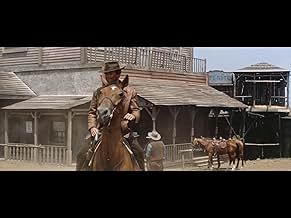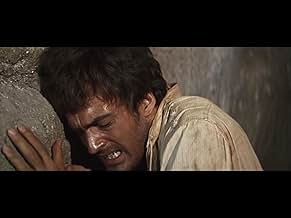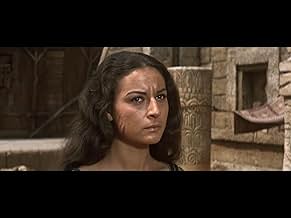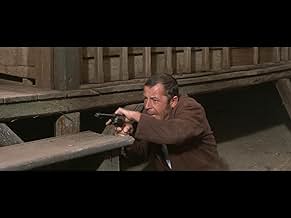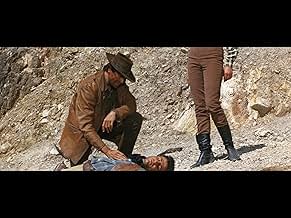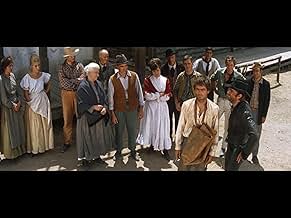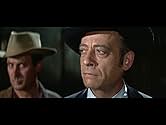IMDb RATING
5.9/10
438
YOUR RATING
Twelve years ago, Sartana framed his brother Johnny for murder and stole his girlfriend. Now the town's undisputed boss and doted over by his possessive mother, Sartana seems safe - until, h... Read allTwelve years ago, Sartana framed his brother Johnny for murder and stole his girlfriend. Now the town's undisputed boss and doted over by his possessive mother, Sartana seems safe - until, his sentence served, Johnny rides back into town.Twelve years ago, Sartana framed his brother Johnny for murder and stole his girlfriend. Now the town's undisputed boss and doted over by his possessive mother, Sartana seems safe - until, his sentence served, Johnny rides back into town.
Gianni Garko
- Sartana Liston
- (as John Garko)
Carlo D'Angelo
- Judge Waldorf
- (as Charles of Angel)
Franco Fantasia
- Sheriff
- (as Frank Farrell)
Roberto Miali
- Jerry Holt
- (as Jerry Wilson)
Carla Calò
- Rhonda
- (as Caroll Brown)
Sal Borgese
- Mexican in Bar
- (uncredited)
Dolores Calò
- Woman Begging for Mercy
- (uncredited)
Featured reviews
Johnny Liston has just finished his twelve-year term in prison and returns back to his hometown to find out his brother Sartana rules the nest and has married his woman. Knowing that his brother framed him, Johnny with the help of his old girlfriend's mute brother Jerry, goes about trying to restore the justice to the ramshackle towns.
The typical staples show up prominently in this surprisingly well-made and rather hard-boiled showcase of spaghetti western bravado. A bit of everything is chucked for good measure in this baroque and rather intense soap opera, which oddly enough has a bemusing amount of developments going on. As its always incident packed (some quite bizarre too), where the high stakes never really take a backseat. Its rough around the edges, but this only enhances that grand guignol splendour of grit, dirt and being soaked in sweat. Albert Cardiff's kinetically snappy and surefooted direction engineers some cracking visuals and paints a very atmospheric mood (like the cracking final confrontation that was meant to be). He makes sure it quickly moves on without bogging us down. Gino Santini, who gets many actively singular zooms and earthy framework shaping it, brightly photographs it. The bone dry and rocky surroundings gave it a real rough edge and Santini milks it accordingly. Michelle Lacarenza's crackerjack soundtrack with that harmonious awe could up the neurotic flair at anytime. Those three facets really gave this production its added bite and overall striking competence. The clunky story is more than a simple revenge formula (well like mentioned by other IMDb reviewers; also a Shakespearean tragedy element streams through it and that of the closeness of family that moulds the town). Flourishing throughout are hilariously campy dialogues and uneven performances. There's dry jokes and subtle humour there about in the script, but it's never over-used. A real mean vibe is chalked up here, as its violent (with its constantly bruising brawls), but not terribly explicit with little blood spilt. At times it can come off as unintentionally silly and Roberto Miali takes the brunt of it with his over-exaggerated performance of the mute, Jerry. Gianni Garko gracefully hams it up as the insane, viper-like villain, Sartana and does an excellent job of it too. Antonio De Teffè is a steady head as Johnny and the stunning Erika Blanc is perfectly cast as vengeful lady Joschita. Franco Fantasia and Carlo D'Angelo are equally good in their parts. Every main character has a complex situation eating away at them that gives them all a little more weight. The dubbing for them is just plain atrocious that I had wish I saw it in its original format.
A fun and real spirited low-budget spaghetti western that can be a stylish and often poetic treat for fans of the sub-genre.
The typical staples show up prominently in this surprisingly well-made and rather hard-boiled showcase of spaghetti western bravado. A bit of everything is chucked for good measure in this baroque and rather intense soap opera, which oddly enough has a bemusing amount of developments going on. As its always incident packed (some quite bizarre too), where the high stakes never really take a backseat. Its rough around the edges, but this only enhances that grand guignol splendour of grit, dirt and being soaked in sweat. Albert Cardiff's kinetically snappy and surefooted direction engineers some cracking visuals and paints a very atmospheric mood (like the cracking final confrontation that was meant to be). He makes sure it quickly moves on without bogging us down. Gino Santini, who gets many actively singular zooms and earthy framework shaping it, brightly photographs it. The bone dry and rocky surroundings gave it a real rough edge and Santini milks it accordingly. Michelle Lacarenza's crackerjack soundtrack with that harmonious awe could up the neurotic flair at anytime. Those three facets really gave this production its added bite and overall striking competence. The clunky story is more than a simple revenge formula (well like mentioned by other IMDb reviewers; also a Shakespearean tragedy element streams through it and that of the closeness of family that moulds the town). Flourishing throughout are hilariously campy dialogues and uneven performances. There's dry jokes and subtle humour there about in the script, but it's never over-used. A real mean vibe is chalked up here, as its violent (with its constantly bruising brawls), but not terribly explicit with little blood spilt. At times it can come off as unintentionally silly and Roberto Miali takes the brunt of it with his over-exaggerated performance of the mute, Jerry. Gianni Garko gracefully hams it up as the insane, viper-like villain, Sartana and does an excellent job of it too. Antonio De Teffè is a steady head as Johnny and the stunning Erika Blanc is perfectly cast as vengeful lady Joschita. Franco Fantasia and Carlo D'Angelo are equally good in their parts. Every main character has a complex situation eating away at them that gives them all a little more weight. The dubbing for them is just plain atrocious that I had wish I saw it in its original format.
A fun and real spirited low-budget spaghetti western that can be a stylish and often poetic treat for fans of the sub-genre.
I had tried to watch this movie before, like a couple years ago, and I found it boring. I was slowly getting into spaghetti westerns at the time. I've started binging them recently, so I thought I'd try again, and without fail, I had the same reaction. This genre is known for its grittiness, realism, and unique storylines that don't necessarily revolve around racial clashes and land disputes like mainstream westerns. I'm all for that, but $1,000 on the Black has cringe acting. For a plot that's serious in nature - two brothers engaging in a vicious battle with each other - the performances are so silly. Johnny Liston (Anthony Steffen) returns to his hometown after enduring imprisonment for 12 years, for a crime that he didn't commit, only to encounter his brother, Sartana (Gianni Garko). He's taken control of the town and has everyone living in fear. He also stole his fiancee, Manuela (Daniela Igliozzi). No one is on Johnny's side, not even his own mother. She praises Sartana, completely ignoring that he's a psychopath. Johnny takes on Manuela's brother, Jerry (Roberto Miali), as his partner, a mute who's not afraid to fight back.
I had hard time seeing this as a drama. I even laughed at one point, when Johnny basically said he was in charge, and Sartana replied 'since when???' With dialogue like that, a movie's not suspenseful or powerful, even if that was the filmmakers' intention. The cast's delivery of their lines sounded so unnatural, and there was just a lot of overacting. Like the scene where Johnny told Jerry that he talked when he was a kid, then asked what happened, which led Jerry to start whimpering hysterically. I didn't wanna laugh, because the reason was evidently traumatic, but his performance was unnecessarily extra. Another issue was scenes dragging on for too long. One of the members of Sartana's gang is chasing around Joselita (Erika Blanc), the woman Johnny rescued from bandits at the beginning of the film, in a circle on his horse. He's getting substantial pleasure out of causing her distress. It took Johnny too long to intervene, to the point that it had got uncomfortable to watch. I think what sealed the deal that this movie was absurd, is during the opening, when Johnny discovers Manuela living in Saratana's compound. He tells him 'I had to do it,' as if his brother being in jail for a dozen years gave him a moral obligation to steal his woman. Johnny should've had a duel with Sartana right at that moment, but he leaves instead. How much sense does that make? So there really wasn't even a need for this almost 2 hour long dumb story if he had beaten the crap out of his brother 5 minutes into the movie.
By the way, for anyone who doesn't know, there's another version of this movie, Blood at Sundown, made in 1965. It says online they're the same film, but the synopses are different on here, so I was confused. I kept doing research, but didn't obtain the answer until I asked Copilot, because Google just wasn't helping. There's actually two Blood at Sundown films. One is translated to "$1,000 on the Black," and the other "Why Go on Killing?" The plot summaries are different because they were marketed under the same name in different regions. Why Go on Killing is shorter in length, so I imagine it's probably more entertaining. I'll probably check it out, but I plan on spending the next week or so watching other spaghetti westerns. I know 1,000 on the Black mostly has positive reviews, but I personally didn't see what the big deal is.
I had hard time seeing this as a drama. I even laughed at one point, when Johnny basically said he was in charge, and Sartana replied 'since when???' With dialogue like that, a movie's not suspenseful or powerful, even if that was the filmmakers' intention. The cast's delivery of their lines sounded so unnatural, and there was just a lot of overacting. Like the scene where Johnny told Jerry that he talked when he was a kid, then asked what happened, which led Jerry to start whimpering hysterically. I didn't wanna laugh, because the reason was evidently traumatic, but his performance was unnecessarily extra. Another issue was scenes dragging on for too long. One of the members of Sartana's gang is chasing around Joselita (Erika Blanc), the woman Johnny rescued from bandits at the beginning of the film, in a circle on his horse. He's getting substantial pleasure out of causing her distress. It took Johnny too long to intervene, to the point that it had got uncomfortable to watch. I think what sealed the deal that this movie was absurd, is during the opening, when Johnny discovers Manuela living in Saratana's compound. He tells him 'I had to do it,' as if his brother being in jail for a dozen years gave him a moral obligation to steal his woman. Johnny should've had a duel with Sartana right at that moment, but he leaves instead. How much sense does that make? So there really wasn't even a need for this almost 2 hour long dumb story if he had beaten the crap out of his brother 5 minutes into the movie.
By the way, for anyone who doesn't know, there's another version of this movie, Blood at Sundown, made in 1965. It says online they're the same film, but the synopses are different on here, so I was confused. I kept doing research, but didn't obtain the answer until I asked Copilot, because Google just wasn't helping. There's actually two Blood at Sundown films. One is translated to "$1,000 on the Black," and the other "Why Go on Killing?" The plot summaries are different because they were marketed under the same name in different regions. Why Go on Killing is shorter in length, so I imagine it's probably more entertaining. I'll probably check it out, but I plan on spending the next week or so watching other spaghetti westerns. I know 1,000 on the Black mostly has positive reviews, but I personally didn't see what the big deal is.
I'm beginning to think that if a movie is not in wide distribution that you can take one point off the IMDb rating. Look at the reviews for this one. One six and everyone else giving it a 7 or 8, but the IMDb rating is 6.3. That's the only reason I'm writing this. It's better than 6.3. lol Not that my "7" really expresses that, but we have to use integers. I'd give it 7.5, and there's LOTS of the genre between 6.3 and 7.5.
I loved the music score, it's a solid story and there's a great edginess about everyone and everything. Sets are good, gun play is solid. I think fans of the genre will want to see it.
I loved the music score, it's a solid story and there's a great edginess about everyone and everything. Sets are good, gun play is solid. I think fans of the genre will want to see it.
After returning from twelve years in jail for a murder he did not commit, a man returns to his home town to confront his brother Sartana who he knows framed him for the crime. Sartana now rules over the area with the help of his gang of thugs but not only that, he's also stolen his brother's woman. The good brother sets about putting this right.
This is quite notable for being a more serious minded spaghetti western than was the norm. Despite this, it's still a fast-paced and entertaining affair. The plot-line is still fairly typical for the genre and by the end of this you can't say it doesn't deliver the usual spaghetti goods. Ultimately, though, it boils down to a tale of two brothers, with Anthony Steffen playing good one and Gianni Garko the one who's psychotic.
This is quite notable for being a more serious minded spaghetti western than was the norm. Despite this, it's still a fast-paced and entertaining affair. The plot-line is still fairly typical for the genre and by the end of this you can't say it doesn't deliver the usual spaghetti goods. Ultimately, though, it boils down to a tale of two brothers, with Anthony Steffen playing good one and Gianni Garko the one who's psychotic.
1000 dollari sul nero / Blood at Sundown
December 18, 1966
Johnny has done twelve years for a crime he didn't commit. He returns to find that his brother Sartana is running runshod over the town. Johnny has also got to contend with the beautiful daughter of the man he supposedly killed. Sartana is fond of abusing Maneula and her dumb-mute brother.
'Now take a nice walk. It'll help you to think better.'
This is a dystopian setup, as I expect to find in a lot of spaghetti westerns. It's a town run by the criminal element. In this case, there's an alliance between an outright thug and a judge. State is indistinguishable from the underworld. The girl melts the heart of a bitter man. His transformation is reflected by the removal of an obscuring hat. The terrible state of society has been facilitated by the tacit approval of a maternal figure. We're all looking for a man to come out of the desert and restore order. In their own defense, the town's people are mostly pasive and useless for the longest time. Garko is effective at conveying the last days of a despot in his bunker.
Anthony Steffen's dubbed voice doesn't match the ultra-grizzled appearance of the character. The bad guys have their hideout in the ruins of an Aztec temple. One of the gang members, played by Sieghardt Rupp, in some shots looks like Timothy Carey. (I would have loved to have seen Timothy Carey in a spaghetti western, provided he did his own voice.) I dig the music by Michele Lacerenza.
'Very well. I love violence! What do you want?'
Alberto Cardone directed L'ira di Dio (1968.) Ernesto Gastaldi also wrote giallos like Your Vice is a Locked Room . .. and The Case of the Bloody Iris. Erika Blanc was in Kill, Baby, Kill (1966). Gianni Garko was no stranger to playing Sartana in films like I Am Sartana, Your Angel of Death (1969.) (This predates all those films.) Carlo D'Angelo was in The Great Silence (1968). Roberto Miali was in something called Mole Men Against the Son of Hercules (1961.)
*** / *****
December 18, 1966
Johnny has done twelve years for a crime he didn't commit. He returns to find that his brother Sartana is running runshod over the town. Johnny has also got to contend with the beautiful daughter of the man he supposedly killed. Sartana is fond of abusing Maneula and her dumb-mute brother.
'Now take a nice walk. It'll help you to think better.'
This is a dystopian setup, as I expect to find in a lot of spaghetti westerns. It's a town run by the criminal element. In this case, there's an alliance between an outright thug and a judge. State is indistinguishable from the underworld. The girl melts the heart of a bitter man. His transformation is reflected by the removal of an obscuring hat. The terrible state of society has been facilitated by the tacit approval of a maternal figure. We're all looking for a man to come out of the desert and restore order. In their own defense, the town's people are mostly pasive and useless for the longest time. Garko is effective at conveying the last days of a despot in his bunker.
Anthony Steffen's dubbed voice doesn't match the ultra-grizzled appearance of the character. The bad guys have their hideout in the ruins of an Aztec temple. One of the gang members, played by Sieghardt Rupp, in some shots looks like Timothy Carey. (I would have loved to have seen Timothy Carey in a spaghetti western, provided he did his own voice.) I dig the music by Michele Lacerenza.
'Very well. I love violence! What do you want?'
Alberto Cardone directed L'ira di Dio (1968.) Ernesto Gastaldi also wrote giallos like Your Vice is a Locked Room . .. and The Case of the Bloody Iris. Erika Blanc was in Kill, Baby, Kill (1966). Gianni Garko was no stranger to playing Sartana in films like I Am Sartana, Your Angel of Death (1969.) (This predates all those films.) Carlo D'Angelo was in The Great Silence (1968). Roberto Miali was in something called Mole Men Against the Son of Hercules (1961.)
*** / *****
Did you know
- TriviaFirst appearance of the Sartana character.
- Alternate versionsThe German version was cut for violence by over 10 minutes in order to get an FSK-18 rating. Despite the censorship, it didn't stop the BPjM from putting this movie on the index list, which resulted in various sales and advertising restrictions. Although removed from the BPjM index list back in 2011, only in December of 2024 was the uncut version granted an FSK-16 rating after the current German rights holder Subkultur Entertainment resubmitted this movie to the FSK for a new rating.
- ConnectionsFeatured in Erika Blanc nei western italiani (2014)
- SoundtracksNecklace of Pearls
(uncredited)
Written by Michele Lacerenza (music) and at Gancarossa
Performed by Peter Boon
Details
- Release date
- Countries of origin
- Languages
- Also known as
- Blood at Sundown
- Filming locations
- Elios Film, Rome, Lazio, Italy(studio: Elios film-Roma)
- Production companies
- See more company credits at IMDbPro
- Runtime
- 1h 42m(102 min)
- Sound mix
- Aspect ratio
- 2.35 : 1
Contribute to this page
Suggest an edit or add missing content

